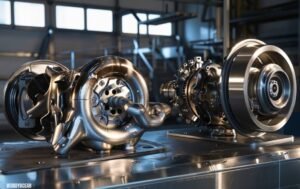Unlock Efficiency with DQ08201 GP N: A Powerful Solution

In the ever-evolving landscape of technology and materials, DQ08201 GP N has emerged as a pivotal component, especially in industries prioritizing innovation and performance. Recognized for its unique properties and versatility, this material is a valuable asset in manufacturing, electronics, and beyond. Understanding it illuminates its technical merits and practical applications that drive efficiency and effectiveness.
This article aims to provide a comprehensive exploration of DQ08201 GP N, addressing its defining features, real-world applications, and significance in modern industry. Readers will find a thorough analysis designed to answer common queries, enhance understanding, and guide decision-making regarding this material.
As you delve deeper, you’ll discover what it is, how it compares with alternatives, and why it stands out in the market. Each section is tailored to demystify complex concepts while providing actionable insights, making it a reliable resource for newcomers and seasoned professionals alike. Whether exploring potential applications or seeking to optimize operations, this guide will equip you with the knowledge you need.
What is DQ08201 GP N?
It is a specialized high-performance material known for its versatility in industrial applications, particularly in manufacturing, electronics, and automotive sectors. Its unique formulation offers exceptional thermal stability, chemical resistance, and mechanical durability, making it a reliable choice for companies focused on innovation.
Developed by material science researchers to address the need for advanced materials, DQ08201 GP N has evolved through continuous improvements based on user feedback and technological advancements. Its engineered blend of polymers and additives optimizes performance, ensuring flexibility and strength under challenging conditions.
In summary, DQ08201 GP N is a dependable material with a robust development history and specialized chemical composition, making it essential for industries seeking high-performance solutions.
Key Features of DQ08201 GP N
Performance Characteristics
DQ08201 GP N is distinguished by its exemplary performance metrics. It excels in thermal stability, maintaining structural integrity at elevated temperatures where lesser materials may fail. Additionally, it offers impressive resistance to various chemicals, making it ideal for environments with corrosive substances. Its tensile strength and elasticity further highlight its robust nature, allowing flexibility without compromising strength. These attributes contribute significantly to the efficiency of systems that incorporate this material.
Compatibility
A standout feature of DQ08201 GP N is its compatibility with a wide range of products and systems. This versatility enables seamless integration into existing manufacturing processes, enhancing the performance of machinery and components. Whether used with metals, plastics, or composites, It maintains its integrity while positively impacting overall system dynamics. This adaptability is especially beneficial in sectors like automotive and electronics, where different materials are frequently combined.
Durability and Reliability
Durability is a hallmark of DQ08201 GP N, ensuring consistent performance under various conditions. Designed to withstand extreme environmental factors—such as high temperatures, humidity, and abrasion—this material promotes a longer lifespan for products, reducing maintenance costs and downtime. Its ability to maintain performance over time, even in challenging applications, reinforces its reliability. Users can trust it to deliver consistent results, making it an essential choice for industries prioritizing longevity and dependability.
In summary, it is characterized by its exceptional performance, broad compatibility, and remarkable durability. These features empower organizations to achieve higher standards of efficiency and reliability, enhancing the overall user experience with this innovative material.
Benefits of Using DQ08201 GP N
Efficiency Improvements
DQ08201 GP N significantly enhances operational efficiency across various applications. Its thermal stability allows effective functioning under extreme conditions, particularly beneficial in high-temperature manufacturing processes. By using this material, organizations can minimize equipment failure risks, leading to fewer production interruptions and increased uptime. Additionally, its chemical resistance reduces the need for frequent maintenance, lowering repair costs and labor. Overall, the enhanced durability streamlines operations, allowing businesses to focus on productivity rather than potential downtime.
Cost-Effectiveness
When it comes to cost-effectiveness, DQ08201 GP N excels compared to traditional materials. While the initial investment may be slightly higher, the long-term savings are substantial. Its durability reduces replacement and maintenance costs, as components made from This Material tend to last longer than standard options. Furthermore, efficiency improvements can lead to lower energy consumption, contributing to overall cost savings. Companies adopting DQ08201 GP N often find that the return on investment outweighs the upfront costs, making it a financially sound choice over time.
Environmental Impact
As industries prioritize sustainability, DQ08201 GP N offers eco-friendly benefits that align with these goals. Its longevity means fewer resources are needed for replacements, directly reducing waste. Additionally, potential future formulations incorporating bio-based components could further enhance its sustainability profile. By utilizing a durable and energy-efficient material, organizations can lower their carbon footprint throughout production processes. This alignment with environmental objectives not only boosts corporate responsibility but also resonates with consumers who favor sustainable practices.
In summary, the benefits of using this material extend beyond impressive performance characteristics. By enhancing operational efficiency, offering cost savings, and positively impacting environmental sustainability, DQ08201 GP N stands out as a top choice for forward-thinking industries. Embracing this innovative solution empowers organizations to improve processes while aligning with modern economic and ecological standards.
How to Choose the Right DQ08201 GP N for Your Needs
Selecting the appropriate DQ08201 GP N for specific applications requires careful consideration of several factors. By assessing the right criteria and understanding the intended usage scenarios, organizations can ensure they make an informed choice that aligns with their operational requirements.
Factors to Consider
When choosing DQ08201 GP N, it is crucial to evaluate its performance characteristics in relation to the specific needs of your application. Begin by assessing the environmental conditions where the material will be used. Consider factors such as temperature range, exposure to chemicals, and mechanical stresses. It is known for its thermal stability and chemical resistance, but these properties can vary based on formulation, so it is essential to review technical specifications closely.
Another key aspect is compatibility with other materials in your system. Ensure that DQ08201 GP N can effectively integrate with existing components without adverse interactions. This is particularly important in complex systems where multiple materials work together. Consulting with suppliers or technical experts can provide valuable insights into compatibility considerations.
Additionally, evaluate the cost-effectiveness of different grades or formulations. While higher-performing variants may have a greater initial investment, their potential for longer life and reduced maintenance costs can yield substantial savings over time. Conducting a cost-benefit analysis based on projected usage and maintenance requirements will help clarify the most suitable option for your needs.
Usage Scenarios
The application context plays a significant role in determining which DQ08201 GP N variant to choose. For high-temperature applications, such as automotive engine components, opt for formulations specifically designed to withstand extreme thermal conditions. These grades will ensure reliability and performance under stress, contributing to overall system efficiency.
In chemical processing environments, where exposure to aggressive substances is a concern, selecting a grade with enhanced chemical resistance is essential. This ensures that components made from this material maintain their integrity and performance, thereby safeguarding operational safety and minimizing downtime.
For electronics applications, where insulation and protection of sensitive components are vital, consider formulations that emphasize electrical insulation properties. These versions of DQ08201 GP N can enhance the performance of electronic devices, reducing the risk of failures and improving overall device longevity.
In summary, choosing the right DQ08201 GP N involves a careful assessment of performance characteristics, compatibility, and cost-effectiveness, tailored to specific usage scenarios. By understanding the requirements of your application and matching them with the appropriate formulation, you can leverage its full potential, ensuring optimal performance and efficiency in your operations.
Conclusion
In summary, DQ08201 GP N stands out as a versatile and high-performance material that meets the demanding needs of various industries. Its exceptional durability, thermal stability, and chemical resistance make it a preferred choice in applications ranging from automotive and electronics to chemical processing. Through real-world testimonials and expert insights, it is clear that DQ08201 GP N enhances operational efficiency and reliability, offering tangible benefits that align with modern industrial requirements.
The careful selection of the right formulation based on specific operational conditions is crucial for maximizing the advantages of DQ08201 GP N. By assessing factors such as temperature resistance, compatibility with other materials, and cost-effectiveness, organizations can make informed decisions that will lead to improved performance and reduced maintenance costs.
As you consider the potential of DQ08201 GP N for your applications, we encourage you to explore further. Whether you are looking to purchase this innovative material, seek expert consultations to tailor solutions for your specific needs, or engage with a community of professionals who share insights and experiences, there are ample opportunities to deepen your understanding. It could be the key to unlocking new levels of efficiency and reliability in your operations. Embrace the benefits it offers and take the next step toward enhancing your industrial capabilities.
FAQs
Q: What is DQ08201 GP N?
A: DQ08201 GP N is a high-performance material known for its exceptional durability, thermal stability, and chemical resistance. It is widely utilized across various industries, including automotive, electronics, and chemical processing, where reliability and performance under demanding conditions are essential.
Q: What are the key features of DQ08201 GP N?
A: The key features of DQ08201 GP N include impressive performance characteristics such as high thermal stability, resistance to a wide range of chemicals, and superior tensile strength. These attributes make it ideal for applications where materials are subjected to extreme temperatures and harsh environments, ensuring longevity and reliability.
Q: What industries utilize DQ08201 GP N?
A: DQ08201 GP N is used in several industries, including manufacturing, automotive, electronics, and aerospace. Its versatility allows it to be applied in components that require durability and performance, such as engine parts, circuit boards, and structural elements in aircraft.
Q: Can you provide examples of successful implementations of DQ08201 GP N?
A: Yes, one example includes its use in an automotive manufacturer that integrated DQ08201 GP N into their engine parts, leading to a significant decrease in mechanical failures due to improved thermal performance. In the electronics industry, a tech company utilized this material for insulating circuit boards, resulting in enhanced device reliability and performance.





